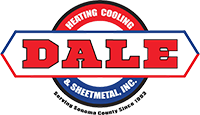Updated: 7/27/2024
Keeping your home comfortable during the hot summer months requires an efficient air conditioning system. Ensuring your AC is energy efficient not only helps reduce your energy bills but also extends the lifespan of your unit, providing long-term savings and comfort.
In this article, we will explore the key aspects of energy-efficient air conditioning, offering practical tips and insights to help you make informed decisions about your HVAC system.
| Topic | Key Points |
|---|---|
| Understanding Energy Efficiency | Importance of energy efficiency, impact on costs, and environmental benefits. |
| Regular HVAC Maintenance | Routine checks, filter replacements, and professional inspections. |
| Upgrading to Energy-Efficient Systems | Benefits of modern systems, features to look for, and potential cost savings. |
| Improving Home Insulation | How insulation affects AC efficiency and tips for improving home insulation. |
| Contact Dale HCS | Encouragement to contact for questions and assistance. |
Now that we understand the importance of energy efficiency, let’s dive into how regular HVAC maintenance can make a significant difference in your AC’s performance.
Regular HVAC Maintenance
Proper HVAC maintenance is crucial for keeping your air conditioning system running efficiently. Regular maintenance helps identify potential issues before they become major problems, ensuring your system operates at peak performance.
First, routine checks and filter replacements are essential. Dirty or clogged filters can significantly reduce your AC’s efficiency, leading to higher energy consumption and increased wear and tear on the system. It’s recommended to check your filters monthly and replace them at least every three months, or more frequently if you have pets or allergies.
Additionally, scheduling professional inspections is vital. HVAC technicians can perform thorough checks, clean internal components, and ensure everything is functioning correctly. These inspections typically include:
- Checking refrigerant levels
- Inspecting and cleaning coils
- Examining electrical connections
- Lubricating moving parts
- Testing the thermostat
Summarizing the importance of regular maintenance, we see that these steps not only improve efficiency but also extend the lifespan of your HVAC system. Next, we will explore the benefits of upgrading to energy-efficient systems.
With regular maintenance covered, let’s look at the advantages of investing in modern, energy-efficient HVAC systems.
Did You Know?
The concept of air conditioning dates back to ancient Egypt? They used reed mats soaked in water hung over windows to cool indoor spaces as the breeze passed through!
Upgrading to Energy-Efficient Systems
Modern energy-efficient HVAC systems offer numerous benefits that make them a worthwhile investment. These systems are designed to use less energy while providing the same, if not better, cooling performance compared to older models.
One of the key features to look for in an energy-efficient system is the SEER (Seasonal Energy Efficiency Ratio) rating. The higher the SEER rating, the more efficient the system. Modern units typically have a SEER rating of 15 or higher, which can significantly reduce your energy bills.
In addition to SEER ratings, consider systems with programmable thermostats. These allow you to set cooling schedules, ensuring your AC runs only when needed, further enhancing efficiency. Features like variable-speed compressors and advanced air filtration systems also contribute to overall energy savings and improved indoor air quality.
Investing in an energy-efficient HVAC system not only reduces your carbon footprint but also qualifies you for various rebates and incentives, lowering the initial cost. It’s a smart choice that pays off in the long run.
Summarizing the benefits of upgrading, we see that modern systems offer enhanced performance and cost savings. Now, let’s move on to another critical factor: improving home insulation.
Upgrading your HVAC system is a significant step, but let’s also consider how improving home insulation can boost your AC’s efficiency.
Improving Home Insulation
Effective home insulation is a key factor in maximizing your air conditioning system’s efficiency. Proper insulation helps maintain a consistent indoor temperature, reducing the workload on your AC and lowering energy consumption.
Start by inspecting your home’s insulation, particularly in the attic, walls, and floors. Poor insulation allows cool air to escape and hot air to enter, making your AC work harder. Adding or upgrading insulation in these areas can significantly improve your home’s energy efficiency.
Windows and doors are common sources of air leaks. Ensure they are properly sealed to prevent air from escaping. Using weatherstripping or caulking around windows and doors can create a more airtight seal, keeping the cool air inside.
In addition to sealing leaks, consider using energy-efficient windows and doors. These are designed to provide better insulation, reducing heat transfer and improving your home’s overall energy efficiency.
Summarizing the impact of insulation, it’s clear that well-insulated homes maintain a more stable temperature, reducing the strain on your HVAC system. Finally, let’s wrap up with how Dale HCS can help you achieve these efficiency goals.
With these insulation tips in mind, let’s conclude by highlighting how Dale HCS can assist you in achieving an energy-efficient home.
Final Thoughts
Achieving an energy-efficient air conditioning system involves understanding the importance of efficiency, performing regular maintenance, upgrading to modern systems, and improving home insulation. Each of these steps contributes to lower energy bills, extended system lifespan, and a more comfortable living environment.
To learn more about how to improve your home’s energy efficiency, contact Dale HCS today.
Contact Dale HCS
For more information or assistance with your HVAC needs, contact Dale HCS your local Sonoma County experts. As a family-owned company, Dale HCS values quality service and customer satisfaction. Reach out to us with any questions, and let us help you achieve an energy-efficient home.

